- Home
- Leslie Meier
Father’s Day Murder Page 2
Father’s Day Murder Read online
Page 2
Toby’s face was red, and Lucy knew he was struggling to keep his temper.
“I didn’t understand,” he said, shaking his head. “I thought you’d done something. I thought you had it under control.”
It sounded reasonable enough to Lucy. Kids expected their parents to take care of things for them. There was a roof over their heads, dinner on the table, clean clothes in the drawers. Dentists’ appointments got made; all they had to do was show up and open wide. That dynamic had changed, of course, when Toby started working for his father. Now he was supposed to earn his keep.
“No!” barked Bill, pointing a finger at him. “That was your job.” He jabbed a finger at him. “You! You were supposed to put in a brace.”
Toby’s face was beet red and his chin was quivering.
“Why didn’t you explain that to me, Dad? Why?”
Bill threw up his hands. “God almighty, do I have to explain everything? This is a job your average idiot could do with his eyes closed and one hand tied behind his back.”
Toby didn’t answer; he fled to the rattletrap Jeep he’d bought with money borrowed from Sara, the family miser, and sped off, spraying gravel.
Bill turned to Lucy. “Can you believe that kid?”
Lucy didn’t want to answer. She figured anything she could say would only make Bill madder, so she just shook her head.
“Can’t you say something?” demanded Bill.
She was spared having to answer by Kudo, who suddenly ran by with a limp chicken in his mouth. Proof positive that once again he’d gotten into Mrs. Pratt’s chicken house.
“I’ll call and find out how much damage he did,” said Lucy, heading for the house.
“You’d better catch him and tie him up first,” said Bill, picking up the crowbar. “You know, Lucy, I can’t guarantee that beast will be here when you get back from Boston.”
Lucy had heard these threats before and didn’t take them seriously. She knew Bill was really fond of Kudo. She suspected that he pretended to be antagonistic so he wouldn’t be asked to help take care of the dog. She shrugged and went inside to get the box of dog treats she kept handy for calling the dog. He could hear her shaking it from miles away, and the sound never failed to bring him home, drooling with anticipation. When she came back out of the house, however, she realized Bill’s truck was gone.
“Great,” she muttered, shaking the jar furiously. Now she didn’t have a ride to the bus.
A half hour later she had locked the dog in the house and had tracked Elizabeth down at her friend Jenna’s house. Impressing upon her the gravity of the situation—that she was going to miss the bus unless Elizabeth returned home immediately with the Subaru—took a bit of doing.
“But, Mom, you said I could have the car while you’re gone.”
“I’m not gone yet, Elizabeth. And unless you take me to the bus stop I won’t be gone at all.”
“Okay, Mom. I’ll be right there.”
She had plenty of time, she told herself, trying to stay calm. At least forty-five minutes. Plenty of time. No reason to panic. She’d go upstairs and get her suitcase and Elizabeth would no doubt be pulling into the driveway when she came down. After all, it was only five minutes to Jenna’s house.
But when Lucy came out on the porch with her jacket and purse slung over her arm and towing her wheeled suitcase, there was no sign of Elizabeth or the car. She went back in the house and reached for the phone.
“Jenna,” she said, struggling to keep a level voice. “Is Elizabeth still there?”
“Oh, hi, Mrs. Stone. Yup, Elizabeth is right here.”
“Could I please speak to her?”
“Sure thing.”
When she heard Elizabeth on the other end of the line, she could barely contain her fury.
“Right now. This minute. Get in the car. Understand?”
Elizabeth understood. Minutes later she rolled into the driveway, loud music pouring from the station wagon’s open windows. Lucy threw her suitcase into the back and climbed into the passenger side.
“There are hamburgers for supper. Dad can grill them. There’s macaroni salad all made, and you can slice up some tomatoes.”
“Sure thing, Mom.”
From her spritely tone and the way her head was bobbing along to a Janet Jackson tune, Lucy doubted she’d heard a word.
“I’m serious, Elizabeth. Don’t forget to pick up Sara and Zoe. Sara gets done with her volunteer job at the animal shelter at four, and you can swing by the Orensteins’ for Zoe then, too.”
“Right, Mom.”
“What did I just say?”
“Grill the tomatoes, slice up the gruesome twosome.”
Lucy let it go.
“You know, the only reason I’m letting you use my car while I’m away is so you can get yourself to work.”
“I know, Mom. I know.”
Elizabeth had taken a job as an au pair for a wealthy couple, Junior and Angela Read, who were summering at his family’s enormous shingled “cottage” overlooking the ocean on Smith Heights Road. Elizabeth would be responsible for taking care of their three-and-a-half-year-old son, Trevor.
“It wouldn’t hurt you to take a look at that old Gesell book I gave you. Trevor’s at a tricky age.” She remembered that when Toby was three and a half she’d been convinced he had gone deaf because he never seemed to hear what she was saying and insisted on ignoring her and stubbornly going his own way. It was only after consulting the child-care books that she’d discovered such behavior was normal. What the book’s authors had neglected to mention was that he might never grow out of it.
“Don’t worry, Mom. We’ll be at the yacht club most of the time.”
“You do understand that the Reads aren’t sending you to the yacht club to get a tan and flirt with the boys, don’t you? They’ll expect you to take care of Trevor.”
“I know. I know. How hard can it be to take care of one little boy? Besides, he’ll probably take a lot of naps and stuff.”
“Sure,” said Lucy, stifling the impulse to burst into hysterical laughter.
The bus was just coming into view when they pulled into the Quik-Stop parking lot.
“Oh, God, I almost forgot Father’s Day.”
Lucy already felt a little pang of guilt. She wasn’t going to be home on Friday after all; Ted wanted her to stay for the morning workshops which meant the next bus didn’t depart until Saturday morning.
“It’s okay, Mom. I know what to do. Honest, I’ve been around for nineteen Father’s Days. In fact, I’ve already got a great idea for a present.”
“Good. Don’t forget the cards. He loves them, and they have to be homemade. The funnier the better.”
“Of course, Mom.”
“Bacon and sausage—he’ll want both.”
“Right.”
“Plenty of eggs.”
“Right.”
“Doughnuts from Jake’s…”
“Absolutely. There’s not enough cholesterol in bacon, sausage, and eggs. Got to have doughnuts, too.”
Lucy smiled at Elizabeth’s joke and got out of the car just as the bus pulled into the parking lot. She was lifting her suitcase out of the back when she remembered the most important thing.
“Don’t forget the Bloody Marys!” she said, leaning on the driver-side door. It certainly wouldn’t be the perfect Father’s Day without Bill’s traditional eye-opener.
“Mom, aren’t you forgetting something?”
Lucy’s mind went blank with terror.
“My toothbrush? Did I remember to pack it?”
“No, the liquor. I can’t buy vodka and neither can Toby. We’re underage.”
“Right, right.” The bus motor was rumbling. “I’ll get vodka. I won’t forget. You get the rest of the stuff.”
“The bus is gonna leave, Mom. You better hurry.”
Before she could say good-bye, Elizabeth had driven out of the parking lot.
Lucy felt alone and deserted. It wouldn’t
have killed Elizabeth to wait a few minutes so she could wave to the departing bus. Maybe even say an encouraging word, like “Have a good time” or “Don’t worry about a thing.”
Lucy trundled her suitcase around the bus and gave it to the driver, who stowed it in the baggage compartment, and bought her ticket. He punched it when he gave it to her, telling her she would need it when she de-barked in Boston. Then she climbed on board and took a seat next to a window. The driver clambered aboard, released the brakes, which gave a huge hiss, and they began to roll.
Alone in her seat, Lucy reached for her cell phone. Things had been so confused when she left that she wanted to make sure everything was all right. Maybe she could catch Bill, just to touch base and let him know she’d left the hotel phone number on the refrigerator. Or Toby, to tell him that his father wasn’t really angry at him; he had just been upset about the shed collapsing. Or she could call Zoe, at her friend Sadie’s house, just to say good-bye and remind her to be a good girl.
Lucy was fingering the phone, trying to decide which number to call, when the bus began the long climb past Red Top Hill and on toward the interstate. From where she sat she had a clear view of the little New England town with its white church steeples rising above the leafy green trees and the Main Street shops with the sparkling blue harbor beyond.
It looked, she thought, like a picture postcard. Or the opening scene from a movie. The credits had finished rolling, the heroine had boarded the bus leaving her small-town past behind her, and the adventure was about to begin.
Chapter Three
Lucy’s first stop when the bus finally pulled into South Station six hours later was to find the ladies’ room. Then, with face and hands freshly washed, hair combed, and a fresh application of lipstick, she went out to find a taxi. The city air, heavy with the pungent exhaust of diesel engines, made her eyes sting, and she felt a little pang of homesickness for Tinker’s Cove, where the ocean breezes kept the air sweet and fresh.
“Park Plaza Hotel,” she told the cabbie, who immediately started the meter. Shocked at the amount it already showed and remembering Ted’s admonition that she had to watch her spending, she asked if it was a long trip.
“Nah,” he said, pulling away from the curb. “Sunday evenings there’s not much traffic. It should be quick.”
Relieved on that score, Lucy leaned back in her seat and prepared to enjoy getting reacquainted with the city. Boston, she knew, was one of the nation’s oldest towns and was filled with treasures like Faneuil Hall, Old Ironsides, and Paul Revere’s house, though Bill maintained there wasn’t really much of the original structure left in the Revere house, and she supposed that since he was a restoration carpenter he would know.
She and Bill had brought the kids into the city a few times over the years, to see Red Sox games at Fenway Park and to visit the Museum of Science, the New England Aquarium, and other attractions, but each trip had been a tense exercise in map reading as they tried to find their way through a maze of unfamiliar roads filled with notoriously unpredictable Boston drivers who considered using a turn signal tantamount to giving away a state secret. Most traumatic of all had been their trip last fall to bring Elizabeth to Chamberlain College, when the stress of the city driving had been compounded by the emotional trauma of separation. Lucy had fought tears for the entire trip, and had hardly noticed her surroundings.
Today, however, she was buoyed by a sense of adventure and looked around eagerly, hoping to spot a familiar landmark. Instead she was dismayed to see that more of the roadways had a makeshift appearance and were lined with long chains of scarred concrete Jersey barriers.
“What’s going on?” she asked, remembering the cranes and numerous road construction projects she’d observed from the bus. “These roads are a mess.”
“You said it, lady. They call it the Big Dig, but the Big Boondoggle is more like it.”
“Big Dig?”
“You never heard of the Big Dig? Where are you from?”
“Maine,” said Lucy, grabbing the door handle and holding on for dear life as the driver whipped around a sharp corner and slammed on the brakes in front of the hotel.
“That explains it,” said the cabbie, turning around to face her. “They’re gonna put all the highways underground. They’ve dug up most of the city. It’s costing a lot of money and making for a lot of aggravation. That’ll be four-twenty.”
Lucy gave him five dollars. “Keep the change,” she said in a burst of extravagance. She’d feared the fare would be much larger.
He nodded his thanks. “You have a nice visit, and while you’re here, take my advice and take the T.”
“Thanks,” said Lucy. “I will.”
A handsomely uniformed doorman opened the door for her with a flourish and Lucy felt rather grand as she entered the lobby, even if she was toting her own suitcase. There was a short line at the desk and she looked around while she waited, taking in the enormous flower arrangement of real flowers on a center table, crystal chandeliers, and the elegant Swan Court restaurant, where white-jacketed waiters tended to the wants of well-dressed customers.
When it was her turn to step to the counter she tried to act as if checking into a hotel alone were something she did every day.
“I have a reservation,” she said. “Lucy Stone.”
The clerk, a skinny young man with a bad complexion in a hotel uniform that was too big for him, bent his head and clicked away at the computer. After endless, apparently fruitless searching, he raised his head.
“Do you have your confirmation number?”
Confirmation number? Eek! What was that?
“Uh, no,” she said. “I don’t think so.”
The clerk looked over her shoulder. “Well, do you have it or not?”
Lucy followed his gaze and saw that the line of impatient customers was growing.
“No.”
“Well, I can’t help you then.”
Lucy panicked. She was alone in the big city and she didn’t have a place to stay. What was she going to do?
“Maybe it’s under Stillings.” She spelled it out. “Ted Stillings.”
The clerk sighed and clicked the name in.
“It’s not here.”
“You don’t have a room for Ted?” Lucy was horrified. “Try the Pennysaver newspaper. That’s P-E-N—”
“Are you with the NNA convention?”
“Yes, I am. And so’s Ted.”
“Well, why didn’t you say so.” He glared at her before bending over the computer once again.
Behind her, Lucy imagined the people waiting in line were sharing her sense of relief.
“Here it is. Credit card please.”
Lucy hesitated. “I thought the paper was paying for my room….”
“For incidentals,” he said, holding out his hand.
Lucy pulled her wallet out of her purse and found the card, hoping that there wouldn’t be many incidentals, whatever they were. She was perilously close to her limit, and heaven only knew what Bill might charge while she was away. She was busily imagining him doing the unthinkable, charging groceries, when the clerk cleared his throat.
“This is your room number,” he said, pointing to a number on the key card folder. “The elevators are behind you.” He paused. “Have a pleasant stay,” he said in a sticky, saccharine voice.
Lucy didn’t think a reply was called for, so she went over to the elevator bank. She was waiting and wondering what her room would be like when she was approached by a tall, dark, handsome man whom she couldn’t name even though he looked very familiar.
“You’re Mrs. Stone, aren’t you?” he asked.
“I am,” admitted Lucy, silently reminding herself that this could be one of those situations her mother had always warned her about. “But how do you know me?”
He gave a disarming chuckle and smiled, revealing two deep dimples in each of his tanned cheeks. Lucy resisted the impulse to smile back and maintained an aloof expression.
<
br /> “Excuse me,” he said, extending a hand. “I’m Luther Read, Junior, but everybody calls me Junior. Your daughter is our mother’s helper. I’ve seen you waiting for her in your car.”
“It’s nice to meet you,” said Lucy, taking his hand. “I am indeed the family chauffeur.”
“Slow elevator,” said Junior, bouncing on the balls of his feet. “So what brings you to Boston?”
“The NNA conference,” said Lucy. “I work for the Tinker’s Cove Pennysaver.”
Recognition dawned in Junior’s eyes. “Lucy Stone. I read your stuff all the time, but I didn’t make the connection.” He chuckled. “I guess we’d better treat Elizabeth right or we’ll be a page-one story.”
Lucy smiled. “You can be sure that whatever Elizabeth tells me will be off the record.” She paused and sighed. “Not that she’s going to tell me much, and certainly not in sentences of more than one word. ‘Where are you going?’ ‘Out.’ ‘Who are you going out with?’ ‘Friends.’ ‘When will you be back?’ ‘Later.’” She rolled her eyes. “You know how it is.”
“Not yet. Trevor’s only three.”
“Well, enjoy him while you can,” advised Lucy. “They grow up too fast.”
The elevator doors were opening and Lucy was preparing to step inside when Junior took her by the elbow.
“Do you mind? There’s somebody I’d like you to meet. I just spotted my father.”
“Okay,” said Lucy, allowing herself to be steered across the lobby to a couple who were seated on one of the oversize sofas that were scattered about. The man, a gray-haired version of Junior, rose as they approached.
“Dad, you’ll never guess who I just met. This is the Pennysaver’s Lucy Stone! Right here in town for the convention. And how’s this for six degrees of separation? Her daughter Elizabeth is our mother’s helper this summer.”
“I’m glad to meet you,” he said, taking her hand. “Junior here forgot to mention that I’m Luther Read, and this is my dear friend Monica Underwood.”

 Christmas Card Murder
Christmas Card Murder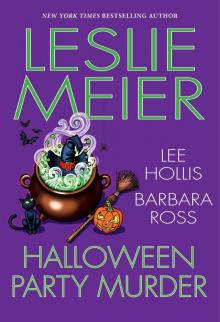 Halloween Party Murder
Halloween Party Murder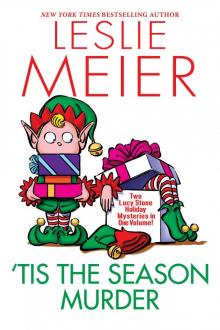 'Tis the Season Murder
'Tis the Season Murder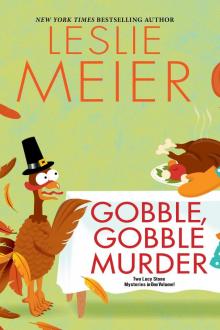 Gobble, Gobble Murder
Gobble, Gobble Murder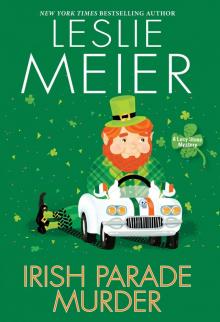 Irish Parade Murder
Irish Parade Murder Bake Sale Murder
Bake Sale Murder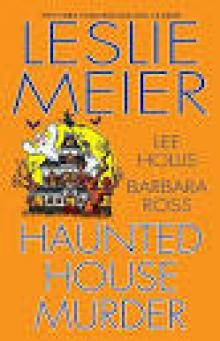 Haunted House Murder
Haunted House Murder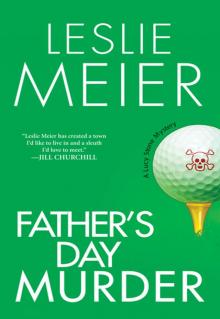 Father’s Day Murder
Father’s Day Murder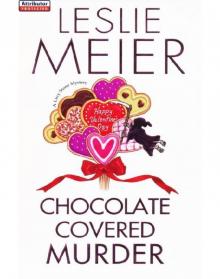 Chocolate Covered Murder
Chocolate Covered Murder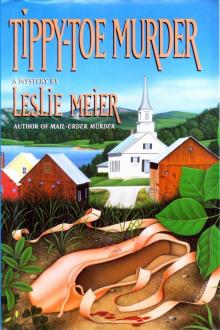 Tippy Toe Murder
Tippy Toe Murder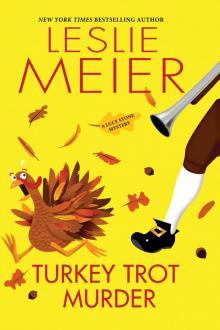 Turkey Trot Murder
Turkey Trot Murder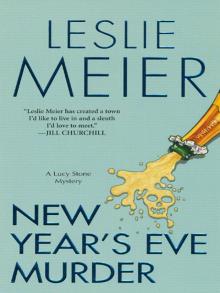 New Year's Eve Murder
New Year's Eve Murder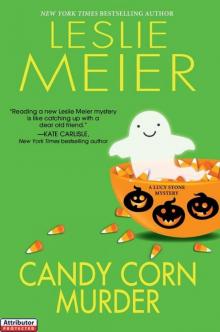 Candy Corn Murder
Candy Corn Murder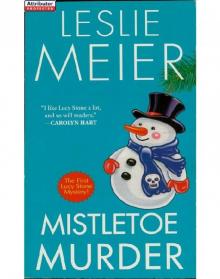 Mistletoe Murder
Mistletoe Murder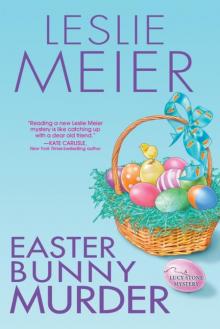 LStone 20 - Easter Bunny Murder
LStone 20 - Easter Bunny Murder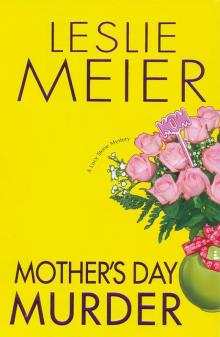 Mother's Day Murder
Mother's Day Murder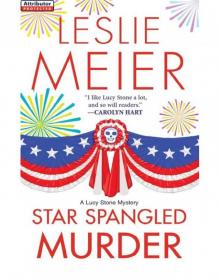 Star Spangled Murder
Star Spangled Murder Silver Anniversary Murder
Silver Anniversary Murder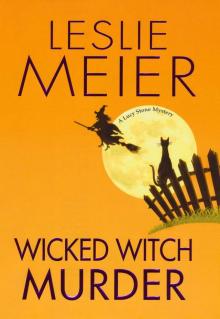 Wicked Witch Murder
Wicked Witch Murder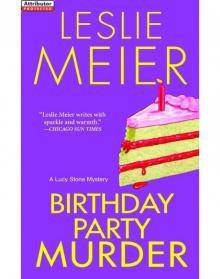 Birthday Party Murder
Birthday Party Murder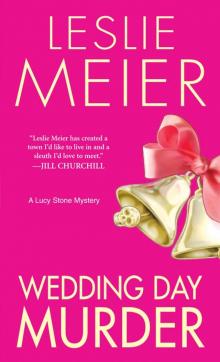 Wedding Day Murder
Wedding Day Murder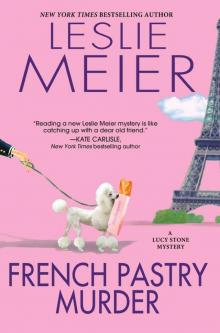 French Pastry Murder
French Pastry Murder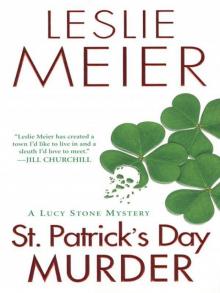 St. Patrick's Day Murder
St. Patrick's Day Murder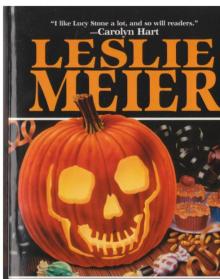 Trick or Treat Murder
Trick or Treat Murder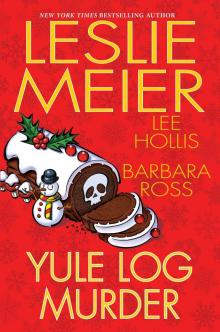 Yule Log Murder
Yule Log Murder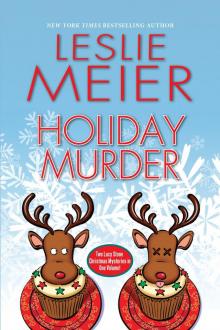 Holiday Murder
Holiday Murder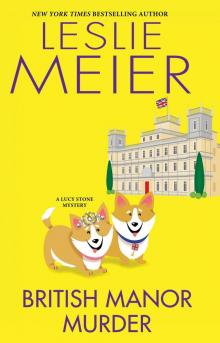 British Manor Murder
British Manor Murder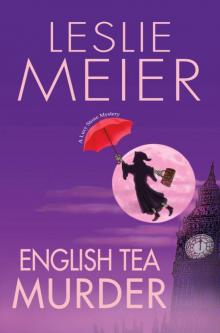 English Tea Murder
English Tea Murder